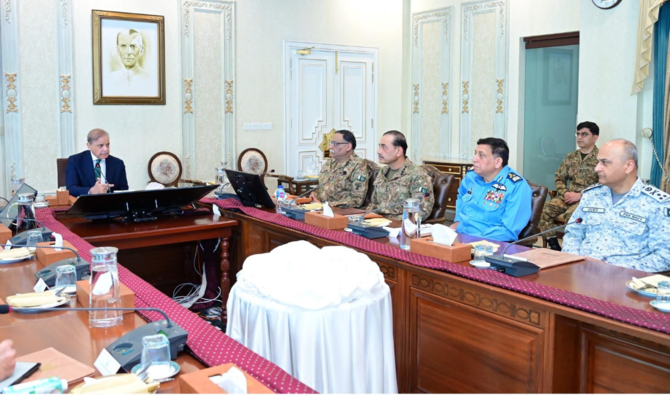ISLAMABAD: Pakistan’s finance ministry assured an International Monetary Fund (IMF) delegation on Thursday it has met all principal economic targets required by the global lender ahead of an economic review under the $3 billion loan program that is likely to help the country secure a $710 million tranche.
The IMF review mission led by Nathan Porter visited the ministry to initiate the two-week-long evaluation process and was briefed by caretaker finance minister Dr. Shamshad Akhtar, central bank governor Jameel Ahmad and officials of Pakistan’s tax collection body on key economic indicators.
A favorable appraisal by the IMF team will pave way for the approval of a second loan tranche under the short-term loan by the Fund’s executive board in December.
Pakistan got a nine-month standby arrangement amounting to $3 billion in July to support the economic stabilization program and received the first tranche of $1.2 billion. The development took place at a time when the South Asian nation of 241 million was struggling to bridge an external financing gap to avert sovereign debt default.
“The caretaker Minister for Finance, Revenue, & Economic Affairs Dr. Shamshad Akhtar welcomed the delegation and shared progress on the Standby Arrangement (SBA),” the ministry said in a statement circulated after the meeting.
“The Minister briefed the Mission on fiscal measures being taken by the Government to improve the economic situation,” it added. “The meeting also included discussions on comprehensive reforms and measures undertaken by FBR and the Government’s strategies to address the circular debt issue.”
According to officials privy to the details of the meeting, the IMF review team was informed that tax collection and petroleum development levy had exceeded the target while the policy of market-based currency exchange rate was also being implemented.
The country has a primary surplus of over Rs400 billion as prices of utilities like gas and electricity have already been revised upward to keep a check on the ballooning of circular debt.
“Mr. Nathan Porter, IMF Mission Chief, appreciated the Government’s commitment to meeting the 1st Quarter targets, and commended the Government’s efforts and measures taken in some critical areas,” the ministry’s statement continued. “He further underscored the importance of continuation of these efforts for staying on track for economic stability of the country.”
Economists agree the government has fulfilled almost all the targets set under the IMF loan program to unlock the second tranche, though they emphasized it was important to remain cautious and ensure sustainability of the fiscal discipline.
“The government has significantly increased the gas and electricity tariffs to meet the IMF targets in the energy sector while other revenue targets have also been met through direct and indirect taxation,” Afia Malik, a senior research economist at Pakistan Institute of Development Economics (PIDE) in Islamabad, told Arab News.
“Looking at all these numbers, Pakistan should easily clear the IMF review for the next tranche,” she said.
Haroon Sharif, former economic adviser to the government, agreed majority of the prior actions for the second tranche had been met with a fiscal deficit between the range of 7 to 7.5 percent as agreed with the Fund.
“We have cut imports, development budget and subsidies to achieve the targets, and now it all looks positive for the IMF review,” he told Arab News.
Sharif cautioned the authorities had achieved majority of the targets through administrative measures, including currency exchange rate, and the IMF would like to see if these actions were sustainable over the period.
“I guess major focus of the Fund will be on sustainability of the fiscal discipline to complete the loan program,” he added.





















